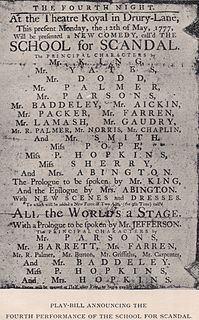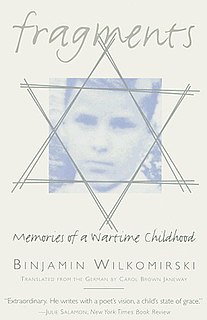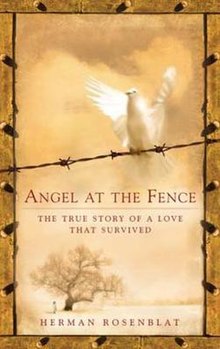
A scandal can be broadly defined as the strong social reactions of outrage, anger, or surprise, when accusations or rumours circulate or appear for some reason, regarding a person or persons who are perceived to have transgressed in some way. These reactions are usually noisy and may be conflicting, and they often have negative effects on the status and credibility of the person(s) or organisation involved. Society is scandalised when it becomes aware of breaches of moral norms or legal requirements, often when these have remained undiscovered or been concealed for some time. Such breaches have typically erupted from greed, lust or the abuse of power. Scandals may be regarded as political, sexual, moral, literary or artistic but often spread from one realm into another. The basis of a scandal may be factual or false, or a combination of both. In contemporary times, exposure of a scandalous situation is often made by mass media.

Fragments: Memories of a Wartime Childhood is a 1995 book, whose author used the pseudonym Binjamin Wilkomirski, which purports to be a memoir of the Holocaust. It was debunked by Swiss journalist and writer Daniel Ganzfried in August 1998. The subsequent disclosure of Wilkomirski's fabrications sparked heated debate in the German and English-speaking world. Many critics argued that Fragments no longer had any literary value. Swiss historian and anti-Semitism expert Stefan Maechler later wrote, "Once the professed interrelationship between the first-person narrator, the death-camp story he narrates, and historical reality are proved palpably false, what was a masterpiece becomes kitsch."
Lew Rywin is a Polish film producer associated with Heritage Films. He has also been a member of the Polish Radio and TV committee and worked in an agency, Poltel, producing for Polish state-run TV.

Berkley Books is an imprint of the Penguin Group.

Enric Marco is an impostor who claimed to have been a prisoner in Nazi German concentration camps Mauthausen and Flossenbürg in World War II. He was awarded the Creu de Sant Jordi by the Catalan government in 2001 and wrote a book on his experiences. In 2005 he admitted his claims were false and returned his medal, after his deception was revealed by university researcher Benito Bermejo.
There is a wide range of ways in which people have represented the Holocaust in popular culture.

Misery porn is a literary genre dwelling on trauma, mental and physical abuse, destitution, or other enervating trials suffered by the protagonists or, allegedly, the writer.
Alex (Uldis) Kurzem is an Australian pensioner originally from Eastern Europe, living in Melbourne; a centre-point of a long-standing controversy regarding his Holocaust memoir which has led to a financial windfall in the early 21st century. He was the subject of a TV documentary and a best-selling book by his son, translated into 13 languages; both entitled The Mascot.

Misha: A Mémoire of the Holocaust Years is a literary hoax by Misha Defonseca, first published in 1997. The book was fraudulently published as a memoir telling the supposed true story of how the author survived the Holocaust as a young Jewish girl, wandering Europe searching for her deported parents. The book sold well in several countries and was made into a film, Survivre avec les loups, named after the claim that Misha was adopted by a pack of wolves during her journey who protected her.
Misha Defonseca is a Belgian-born impersonator and the author of a fraudulent Holocaust memoir titled Misha: A Mémoire of the Holocaust Years, first published in 1997 and at that time professed to be a true memoir. It became an instant success in Europe and was translated into 18 languages. The French version of the book was a derivative work based on the original with the title Survivre avec les loups that was published in 1997 by the Éditions Robert Laffont; this second version was adapted into the French film of the same name.
Fake memoirs form a category of literary forgery in which a wholly or partially fabricated autobiography, memoir or journal of an individual is presented as fact. In some cases, the purported author of the work is also a fabrication. In recent years, there have been a number of such memoirs published by major publishers, some that were well received critically and became best sellers, even though subsequently proven to be partially or completely fabricated. A number of recent fake memoirs fall into the category of "misery lit," where the authors claim to have overcome bereavement, abuse, addiction, poverty and other overwhelming losses. Several more have detailed fabricated stories of Holocaust survival, with at least one having been penned by an actual Holocaust victim.

Oprah Gail Winfrey is an American talk show host, television producer, actress, author, and philanthropist. She is best known for her talk show, The Oprah Winfrey Show, broadcast from Chicago, which was the highest-rated television program of its kind in history and ran in national syndication for 25 years, from 1986 to 2011. Dubbed the "Queen of All Media," she was the richest African-American of the 20th century, was once the world's only black billionaire, and the greatest black philanthropist in U.S. history. By 2007, she was sometimes ranked as the most influential woman in the world.

Herman A. Rosenblat was a Polish-born American author, known for writing a fictitious Holocaust memoir titled Angel at the Fence, purporting to tell the true story of a girl who passed him food through the barbed-wire fence at the Schlieben sub-camp of the Buchenwald concentration camp in World War II. The book was planned to be published in 2009 by Berkley Books, but was cancelled after it turned out that many elements of his memoir were fabricated and some were contrary to verifiable historical facts. Rosenblat later admitted to lying on purpose with the intention of bringing joy.
Kenneth Alan "Kenny" Waltzer is an American historian and educator, currently director of the Jewish Studies program at Michigan State University (MSU). His research on the Buchenwald concentration camp has focused on the rescue of children and youths inside the camp and has included some notable findings.
Sharon Sergeant is an American forensic genealogist who specializes in researching and tracing international fraud cases, property settlements, and provenance of artifact collections. She also conducts biographical research for historians, publishers, authors, and journalists. Sergeant attended Northeastern University and received a bachelor's degree from Boston University. She lives in Waltham, Massachusetts.

The Man Who Broke Into Auschwitz is the title of an autobiographical book by Denis Avey, who is a recipient of a British Hero of the Holocaust award. The book was written together with Rob Broomby and published by Hodder in 2011. It carries a foreword by Sir Martin Gilbert. The novelist James Long assisted with research and helped to edit and structure the manuscript.
Rosemarie Pence is a German-American woman who posed as a child Holocaust survivor from the Dachau Concentration Camp. Pence became the subject of a fake biography titled Hannah: From Dachau to the Olympics and Beyond published in 2005. Her fabrications, which included fake Jewish background, were discovered in 2009. By 2012 she was wanted in Colorado's Boulder County on an arrest warrant for the theft of more than $20,000 and check fraud.
Donald Joseph Watt was an Australian Army soldier and the author of a literary hoax, a fictitious Holocaust memoir entitled Stoker: The Story of an Australian Soldier who Survived Auschwitz-Birkenau, published in 1995 by Simon & Schuster. Only the disclosure of Watt's fabrications altered the status of the book which was initially praised by various Jewish organizations as the most important work written in Australia.

Hannah: From Dachau to the Olympics and Beyond is a Holocaust biography written by Jean Goodwin Messinger about Hannah Pence. The book gained notoriety when it was revealed that the entire story had been fabricated by Pence.










